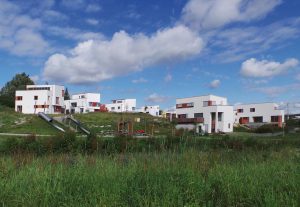Exploit potential at neighbourhood level!
The KfW programme "Energy-efficient urban refurbishment" promotes integrated energy-efficient neighbourhood concepts and refurbishment management with programme part 432. Programme parts 201 and 202 provide investment support for cross-building and infrastructural supply systems. The Federal Ministry of the Interior, for Building and the Home Affairs provides the funding for the energy refurbishment process from the individual building to the neighbourhood from the Energy and Climate Fund (EKF).
Further information:
www.energetische-stadtsanierung.info
Keywords: Stock, DE-News, Movies, Movies < 4 Min, Funding, Climate protection, Quarters, Settlements, Thermal insulation


